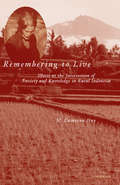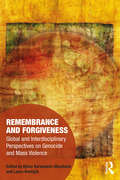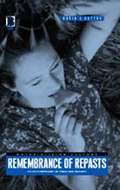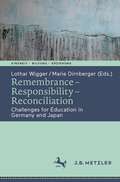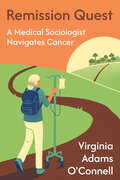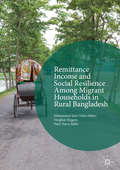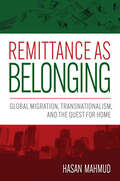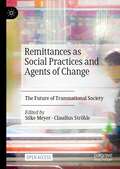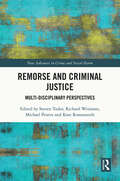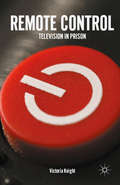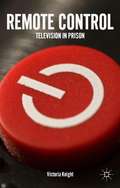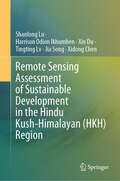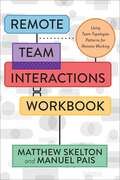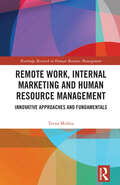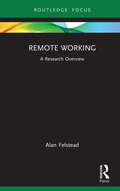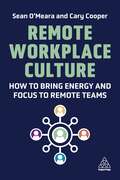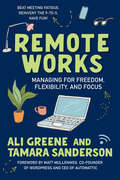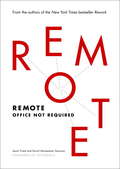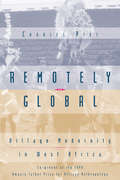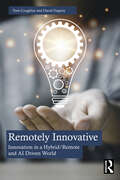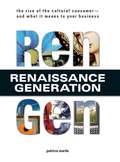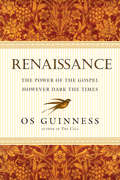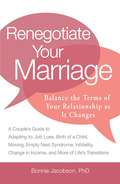- Table View
- List View
Remembering to Live: Illness at the Intersection of Anxiety and Knowledge in Rural Indonesia
by M. Cameron HaySasaks, a people of the Indonesian archipelago, cope with one of the country's worst health records by employing various medical traditions, including their own secret ethnomedical knowledge. But anxiety, in the presence and absence of illness, profoundly shapes the ways Sasaks use healing and knowledge. Hay addresses complex questions regarding cultural models, agency, and other relationships to conclude that the ethnomedical knowledge they use to cope with their illnesses ironically inhibits improvements in their health care.
Remembrance and Forgiveness: Global and Interdisciplinary Perspectives on Genocide and Mass Violence (Memory Studies: Global Constellations)
by Ajlina Karamehić-Muratović and Laura KromjákAn enquiry into the social science of remembrance and forgiveness in global episodes of genocide and mass violence during the post-Holocaust era, this volume explores the ways in which remembrance and forgiveness have changed over time and how they have been used in more recent cases of genocide and mass violence. With case studies from Rwanda, Ethiopia, South Sudan, South Africa, Australia, Cambodia, Indonesia, Timor-Leste, Israel, Palestine, Argentina, Guatemala, El Salvador, the United States, Bosnia and Herzegovina, and Chechnya, the volume avoids a purely legal perspective to open the interpretation of post-genocidal societies, communities, and individuals to global and interdisciplinary perspectives that consider not only forgiveness and thus social harmony, but remembrance and disharmony. This volume will appeal to scholars across the social sciences with interests in memory studies, genocide, remembrance, and forgiveness.
Remembrance of Repasts: An Anthropology of Food and Memory (Materializing Culture)
by David E. SuttonThis book offers a theoretical account of the interrelationship of culture, food and memory. Sutton challenges and expands anthropologys current focus on issues of embodiment, memory and material culture, especially in relation to transnational migration and the flow of culture across borders and boundaries. The Greek island of Kalymnos in the eastern Aegean, where Islanders claim to remember meals long past -- both humble and spectacular provides the main setting for these issues, as well as comparative materials drawn from England and the United States. Despite the growing interest in anthropological accounts of food and in the cultural construction of memory, the intersection of food with memory has not been accorded sustained examination. Cultural practices of feasting and fasting, global flows of food as both gifts and commodities, the rise of processed food and the relationship of orally transmitted recipes to the vast market in speciality cookbooks tie traditional anthropological mainstays such as ritual, exchange and death to more current concerns with structure and history, cognition and the anthropology of the senses. Arguing for the crucial role of a simultaneous consideration of food and memory, this book significantly advances our understanding of cultural processes and reformulates current theoretical preoccupations.
Remembrance – Responsibility – Reconciliation: Challenges for Education in Germany and Japan (Kindheit – Bildung – Erziehung. Philosophische Perspektiven)
by Lothar Wigger Marie DirnbergerGermany and Japan have taken different ways of dealing with the past of the traumatic events of World War II and their own role. Even after 75 years, the battles for remembrance are not over in both countries. Questions about responsibility, about the educational consequences of history and about possibilities for reconciliation with former enemies are constantly being asked anew and require new answers. The contributions in the book address these questions from a Japanese and German perspective on the basis of empirical and historical research, combining historical, educational, and philosophical approaches and opening up new perspectives for academic research as well as for practical educational work by comparing the cultures of remembrance.
Remission Quest: A Medical Sociologist Navigates Cancer
by Virginia Adams O'ConnellAs a medical sociologist, Virginia Adams O’Connell long studied the healthcare system and people navigating illness. Then, in 2019, she confronted her own reality of being diagnosed with primary bone lymphoma. “Since my diagnosis, I joined a club of current and past patients that I never wanted or intended to join,” she writes with both candor and poignancy, adding, “But we can collectively work to make it the best club it can be.” In the course of diagnosis, treatment, and recovery, Adams O’Connell lived through theories she had researched and applied her sociological ideas to help make sense of her personal experiences. Remission Quest chronicles how the reality of living with cancer changed her perspective on what she had studied. Adams O’Connell found her knowledge illustrated and enriched her sociological analysis of our medical institutions and that her own illness narrative shone new light on her theories. With moving prose, Remission Quest captures the emotions of having cancer and dealing with elaborate medical systems, learning how to be a “good patient” while also managing indescribable fear and fatigue, and confronting questions about the meaning of life. Adams O’Connell’s experiences are both personal and universal. They provide inspiration, compassion, and understanding.
Remittance Income and Social Resilience among Migrant Households in Rural Bangladesh
by Vaughan Higgins Mohammad Jalal Uddin Sikder Peter Harry BallisThis book examines how migrant remittances contribute to household social resilience in rural Bangladesh. Using a mixed methods approach, the authors show that remittances play a crucial role in enhancing the life chances and economic livelihoods of rural households, and that remittance income enables households to overcome immediate pressures, adapt to economic and environmental change, build economic and cultural capital, and provide greater certainty in planning for the future. However, the book also reveals that the social and economic benefits of remittances are not experienced equally by all households. Rural village households endure a precarious existence and the potentially positive outcomes of remittances can easily be undermined by a range of external and household-specific factors leading to few, if any, benefits in terms of household social resilience.
Remittance as Belonging: Global Migration, Transnationalism, and the Quest for Home
by Hasan MahmudRemittance as Belonging: Global Migration, Transnationalism, and the Quest for Home argues that migrants' remittances express their sense of belonging and connectedness to their home country of origin, making an integral part of both migrants’ ethnic identity and sense of what they call home. Drawing on three and a half years of ethnographic fieldwork with Bangladeshi migrants in Tokyo and Los Angeles, Hasan Mahmud demonstrates that while migrants go abroad for various reasons, they do not travel alone. Although they leave behind their families in Bangladesh, they move abroad essentially as members of their family and community and maintain their belonging to home through transnational practices, including remittance sending. By conceptualizing remittance as an expression of migrants’ belonging, this book presents detailed accounts of the emergence, growth, decline, and revival of remittances as a function of transformations in migrants’ sense of belonging to home.
Remittances as Social Practices and Agents of Change: The Future of Transnational Society
by Silke Meyer Claudius StröhleThis open access book explores the transformative effects of remittances. Remittances are conceptualized as flows of money, objects, ideas, traditions, and symbolic capital, mapping out a cross-border space in which people live, work, and communicate with multiple belongings. By doing so, they effect social change both in places of origin and destination. However, their power to improve individual living conditions and community infrastructure mainly results from global inequality. Hence, we challenge the remittance mantra and go beyond the migration-development-nexus by revealing dependencies and frictions in remittance relations. Remittances are thus scrutinized in their effects on both social cohesion and social rupture. By highlighting the transformative effects of remittance in the context of conflict, climate change, and the postcolonial, we shed light on the future of transnational society.Presenting empirical case studies from Ghana, Burkina Faso, Sri Lanka, New Zealand, Turkey, Lebanon, USA, Japan, and various European countries, as well as historical North America and the Habsburg Empire, we explore remittance relations from a range of disciplines including anthropology, sociology, history, design, architecture, governance, and peace studies.
Remorse and Criminal Justice: Multi-Disciplinary Perspectives (New Advances in Crime and Social Harm)
by Richard Weisman Michael Proeve Steven Tudor Kate RossmanithThis multidisciplinary collection brings together original contributions to present the best of current thinking about the nature and place of remorse in the context of criminal justice. Despite the wide-spread and long-standing nature of interest in offender remorse, the topic has until recently been peripheral in academic studies. The authors are scholars from North America, the UK, Europe, South Africa and Australia, from diverse academic disciplines. They reflect on the role of remorse in law, for better or for worse, on how expressions of remorse are affected by the legal contexts in which they arise, and on the impact of these expressions on the individual, the court, and the community. The work is divided into four parts – Part I Judging Remorse addresses issues concerning the task of assessing remorse in the courtroom, usually prior to determining sentence. Part II Remorse Beyond the Courtroom explores the place and significance of remorse in various post-court settings. Part III Remorse, War and Social Trauma addresses remorse in the context of political violence and social trauma in the former Yugoslavia and South Africa. Finally, Part IV Reflections seeks to underscore the multidisciplinary and interdisciplinary nature of the collection as a whole, through personal and disciplinary reflections on remorse. The work provides a showcase for how diverse academic disciplines can be brought together through a focus on a common topic. As such, the collection will become a standard reference work for further research across a range of disciplines and promote inter-disciplinary dialogue.
Remote Control: Television in Prison
by V. KnightIn-cell television is now a permanent feature of prisons in England and Wales, and a key part of the experience of modern incarceration. This sociological exploration of prisoners' use of television offers an engaging and thought provoking insight into the domestic and everyday lives of people in prison - with television close at hand. Victoria Knight explores how television contributes to imprisonment by normalising the prison cell. In doing so it legitimates this space to hold prisoners for long periods of time, typically without structured activity. As a consequence, television's place in the modern prison has also come to represent an unanticipated resource in the package of care for prisoners.This book uncovers the complex and rich emotive responses to prison life. Dimensions of boredom, anger, frustration, pleasure and happiness appear through the rich narratives of both prisoners and staff, indicating the ways institutions and individuals deal with their emotions. It also offers an insight into the unfolding future of the digital world in prisons and begins to consider how the prisoner can benefit from engagement with digital technologies. It will be of great interest to practitioners and scholars of prisons and penology, as well as those interested in the impact of television on society.
Remote Control: Television in Prison
by Victoria KnightIn-cell television is now a permanent feature of prisons in England and Wales, and a key part of the experience of modern incarceration. This sociological exploration of prisoners' use of television offers an engaging and thought provoking insight into the domestic and everyday lives of people in prison - with television close at hand. Victoria Knight explores how television contributes to imprisonment by normalising the prison cell. In doing so it legitimates this space to hold prisoners for long periods of time, typically without structured activity. As a consequence, television's place in the modern prison has also come to represent an unanticipated resource in the package of care for prisoners.
Remote Sensing Assessment of Sustainable Development in the Hindu Kush-Himalayan (HKH) Region
by Jia Song Xin Du Shanlong Lu Harrison Odion Ikhumhen Tingting Lv Xidong ChenThis book serves as a vital foundation for regional collaboration, urging stakeholders to adopt innovative, interdisciplinary approaches. The Hindu Kush Himalaya (HKH) region, renowned for its ecological diversity and essential freshwater resources, faces pressing sustainability challenges that require comprehensive solutions. This assessment report unifies decades of research on the HKH, providing critical insights and practical strategies for sustainable development in the context of rapid urbanization and climate change. Through advanced analysis utilizing long-term time series models and satellite remote sensing data, the report addresses how urbanization and environmental shifts affect regional hydrology, how agricultural practices contribute to food security, and the extensive impacts of human activities on fragile ecosystems. In a bid to enhance knowledge-sharing, the report introduces a robust database platform, enabling researchers, policymakers, and local communities to access and apply critical data. This platform fosters a collective effort to respond effectively to environmental degradation and climate threats, while also creating a reference framework for other regions facing similar issues. Targeted toward policymakers, researchers, and sustainability practitioners, this report aims to drive informed decision-making, encourage sustainable practices, and protect the resilience of the HKH for future generations.
Remote Team Interactions Workbook: Using Team Topologies Patterns for Remote Working
by Matthew SkeltonIn the new remote-first and hybrid workplace, many organizations are struggling to catch up with new tooling and ways of working. Many are discovering for the first time that the physical office was covering up poorly defined teams and poorly defined areas of focus, threatening their DevOps transformation efforts and the overall health and success of their business. Matthew Skelton and Manuel Pais, coauthors of the highly successful Team Topologies, provide proven patterns for a successful remote-first approach to teams. Using simple tools for dependency tracking and patterns from Team Topologies, such as the Team API, organizations will find that well-defined team interactions are key to effective IT delivery in the remote-first world.This workbook explores several aspects of team-first remote work, including: •How the new &“remote-first&” world is highlighting existing poor team interactions within organizations.•Why organizations should use the Team API pattern to define and communicate the focus of teams.•How organizations can track and remove team-level dependencies.•How and why organizations should design inter-team communications consciously.•How and why organizations can use the three team interaction modes from Team Topologies (collaboration, x-as-a-service, and facilitating) to help.The ideas and patterns presented here will help your organization become more effective with a team-based, remote-first approach to building and running software systems.
Remote Work Revolution: Succeeding from Anywhere
by Tsedal Neeley“I often talk about the importance of trust when it comes to work: the trust of your employees and building trust with your customers. This book provides a blueprint for how to build and maintain that trust and connection in a digital environment.” —Eric S. Yuan, founder and CEO of ZoomA Harvard Business School professor and leading expert in virtual and global work provides remote workers and leaders with the best practices necessary to perform at the highest levels in their organizations. The rapid and unprecedented changes brought on by Covid-19 have accelerated the transition to remote working, requiring the wholesale migration of nearly entire companies to virtual work in just weeks, leaving managers and employees scrambling to adjust. This massive transition has forced companies to rapidly advance their digital footprint, using cloud, storage, cybersecurity, and device tools to accommodate their new remote workforce.Experiencing the benefits of remote working—including nonexistent commute times, lower operational costs, and a larger pool of global job applicants—many companies, including Twitter and Google, plan to permanently incorporate remote days or give employees the option to work from home full-time. But virtual work has it challenges. Employees feel lost, isolated, out of sync, and out of sight. They want to know how to build trust, maintain connections without in-person interactions, and a proper work/life balance. Managers want to know how to lead virtually, how to keep their teams motivated, what digital tools they’ll need, and how to keep employees productive.Providing compelling, evidence-based answers to these and other pressing issues, Remote Work Revolution is essential for navigating the enduring challenges teams and managers face. Filled with specific actionable steps and interactive tools, this timely book will help team members deliver results previously out of reach. Following Neeley’s advice, employees will be able to break through routine norms to successfully use remote work to benefit themselves, their groups, and ultimately their organizations.
Remote Work, Internal Marketing and Human Resource Management: Innovative Approaches and Fundamentals (Routledge Research in Human Resource Management)
by Teena MishraRemote working is a developing idea that many organizations are embracing, especially in light of COVID-19 and the rise in demand for remote and hybrid roles. As there is no standard model to use for implementation, a number of problems and difficulties develop as popularity increases and hybrid working environments become normalized. This book presents the views, opinions, and reality of remote work and creating an appropriate internal marketing culture in a remote environment. The key topics explored are the significance of remote work, remote work practice, reshaping the work environment, designing remote work, models of remote work, challenges of remote work facing business organizations, remote work management, innovations and technology, the role of motivation and satisfaction in organizational development, employee empowerment in a remote setting, transparency and commitment for sustainable development, and the future of remote work. This research volume will be of value to researchers, academicians, practitioners, and students in the fields of human resource management, organizational studies, and innovation management.
Remote Working: A Research Overview (State of the Art in Business Research)
by Alan FelsteadThe coronavirus pandemic forced work back into the home on a massive scale. The long-held belief that work and home are separate spheres of economic life was turned on its head overnight. Many employees were new to this way of working and many employers had to manage a disparate workforce for the first time. This book reviews what impact this shift had on the lives of millions of employees, the organisations which employ them and the societies in which they live. It also looks to a future in which more work is carried out remotely – at home, in the local café, restaurant or bar, or while moving from place to place. The book syntheses the existing evidence in an accessible and easy-to-read way. It will appeal to all those who want a quick and concise introduction to the major themes associated with remote and hybrid working. This will include teachers, lecturers, students, academics and policy-makers as well as those who have experienced the challenges and benefits of homeworking first-hand.
Remote Workplace Culture: How to Bring Energy and Focus to Remote Teams
by Cary Cooper Sean O'MearaThe way we work has changed and a strong, supportive company culture is key for success. When employees work remotely, even occasionally, HR professionals and business leaders need to think differently.Practitioners now need to motivate their workforce, support talent development, ensure an inclusive environment and protect their employees' mental health, all without being in the same physical space. A strong and effective company culture that is built specifically with this purpose in mind is crucial. Remote Workplace Culture is a practical guide that shows how to achieve this and explains why simply replicating what used to happen in the office in a virtual environment doesn't work. This book shows how a strong culture for remote, hybrid and flexible working helps attract the best talent, whether this is nationally or globally and explains how to prioritize inclusion. There is also specific guidance on wellbeing initiatives, how to replace social learning in a hybrid or remote working culture and how to avoid common pitfalls such as an overreliance on technology, the blurring of work/life boundaries and a misunderstanding of remote working etiquette. Supported by case studies from BBC, Salesforce, leading financial services brands and law firms, Remote Workplace Culture is essential reading for all HR professionals and business leaders needing to develop strong company culture in the new world of work.
Remote Works: Managing for Freedom, Flexibility, and Focus
by Ali Greene Tamara SandersonThe future of work is here. You can no longer survive by copying and pasting old office techniques into a digital environment; it's exhausting, unproductive, and unsuccessful. There is a better way! Are you ready to rethink everything you know about how remote works?Drawing on their years of experience working at remote companies DuckDuckGo and Automattic, plus dozens of interviews with leading experts, Ali Greene and Tamara Sanderson have written the ultimate playbook for managing remote teams. This book addresses challenges such as communicating effectively (with fewer meetings!), eliminating frustration over what tools to use, establishing team norms, and focusing on getting things done. You will learn how to work best remotely and create a workplace designed for freedom, flexibility, and focus.For decades, we've planned our lives around our work. Now it's time to intentionally design work to fit our lives.
Remote: Office Not Required
by Jason Fried David Heinemeier HanssonThe "work from home" phenomenon is thoroughly explored in this illuminating new book from bestselling 37signals founders Fried and Hansson, who point to the surging trend of employees working from home (and anywhere else) and explain the challenges and unexpected benefits.<P><P> Most important, they show why - with a few controversial exceptions such as Yahoo -- more businesses will want to promote this new model of getting things done.The Industrial Revolution's "under one roof" model of conducting work is steadily declining owing to technology that is rapidly creating virtual workspaces and allowing workers to provide their vital contribution without physically clustering together. Today, the new paradigm is "move work to the workers, rather than workers to the workplace." According to Reuters, one in five global workers telecommutes frequently and nearly ten percent work from home every day. Moms in particular will welcome this trend. A full 60% wish they had a flexible work option. But companies see advantages too in the way remote work increases their talent pool, reduces turnover, lessens their real estate footprint, and improves the ability to conduct business across multiple time zones, to name just a few advantages. In Remote, inconoclastic authors Fried and Hansson will convince readers that letting all or part of work teams function remotely is a great idea--and they're going to show precisely how a remote work setup can be accomplished.
Remotely Global: Village Modernity in West Africa
by Charles PiotAt first glance, the remote villages of the Kabre people of northern Togo appear to have all the trappings of a classic "out of the way" African culture—subsistence farming, straw-roofed houses, and rituals to the spirits and ancestors. Arguing that village life is in fact an effect of the modern and the global, Charles Piot suggests that Kabre culture is shaped as much by colonial and postcolonial history as by anything "indigenous" or local. Through analyses of everyday and ceremonial social practices, Piot illustrates the intertwining of modernity with tradition and of the local with the national and global. In a striking example of the appropriation of tradition by the state, Togo's Kabre president regularly flies to the region in his helicopter to witness male initiation ceremonies. Confounding both anthropological theorizations and the State Department's stereotyped images of African village life, Remotely Global aims to rethink Euroamerican theories that fail to come to terms with the fluidity of everyday relations in a society where persons and things are forever in motion.
Remotely Innovative: Innovation a Hybrid/Remote and AI Driven World
by David Fogarty Tom CoughlanIn the near term, the future will not belong to AI, but it will belong to the people who understand AI and how to strategically leverage its advantages.This book gives managers a new perspective on innovation and AI—allowing them to seize the future. As the pace of change has increased, organizations have needed to invest in innovation initiatives to survive and thrive. Up until now, these models have focused on co-location, which is no longer an option in some cases and may not be necessary for all, leaving organizations scrambling for options. Following up on their work in Managing at a Distance, Tom Coughlan and David Fogarty have developed this guide to help managers navigate the challenges of innovation in a world of hybrid and remote workers amidst the ever-increasing use of AI. They tackle questions such as the difference between creativity and innovation and how proximity (or lack of it) impacts teams, and present strategic, structural, and measurement solutions to maximize the role of AI in successful innovation while not minimizing the people who make up organizations.Platform-agnostic, this book will appeal to organizational leaders and managers who work with knowledge workers of any type, as well as students and instructors in graduate business courses, executive education, and corporate training programs.
Ren Gen RENAISSANCE GENERATION
by Patricia MartinRenGen provides a lens through which you can recognize and leverage the sea change occurring in your city, community, and the marketplace at large
Renaissance Man (Routledge Library Editions: Social and Cultural Anthropology)
by Ágnes HellerConsidering such witnesses of the time as Shakespeare, Dante, Petrarch, Michelangelo, Machiavelli, Montaigne, More and Bacon, Agnes Heller looks at both the concept and the image of a Renaissance man. The concept was generalised and accepted by all; its characteristic features were man as a dynamic being, creating and re-creating himself throughout his life. The images of man, however, were very different, having been formed through the ideas and imagination of artists, politicians, philosophers, scientists and theologians and viewed from the different aspects of work, love, fate, death, friendship, devotion and the concepts of space and time. Renaissance Man thus stood as both as a leading protagonist of his time, one who led and formulated the substantial attitudes of his time, and as one who stood as a witness on the sidelines of the discussion. This book, first published in English in 1978, is based on the diverse but equally important sources of autobiographies, works of art and literature, and the writings of philosophers. Although she uses Florence as a starting point, Agnes Heller points out that the Renaissance was a social and cultural phenomenon common to all of Western Europe; her Renaissance Man is thus a figure to be found throughout Europe.
Renaissance: The Power of the Gospel However Dark the Times
by Os GuinnessLogos Bookstores' 2015 Best Book in Christianity and CultureHonorable Mention, 2014 Best Book of the Year from Byron Borger, Hearts and Minds BookstoreRenaissance,no.
Renegotiate Your Marriage: Balance the Terms of Your Relationship as It Changes
by Bonnie JacobsonWhen you got married, you and your spouse made a contract. Oh, not the one you signed in church or at the registry office. It was a contract no one but the two of you knew about. One that sets the terms of your relationship. But that contract can and does change. It changes when: you or your spouse lose your job; your first child is born; the kids leave home; your spouse cheats on you. Big changes in your life mean big changes in your marriage as well. And in this guide to a happy, healthy marriage you'll learn how to renegotiate your marriage during the ups and downs of life so that it can survive. Most of all, you'll learn the secrets to renegotiating your marriage contract so both of you remain committed to a strong, healthy, and happy wedlock.
